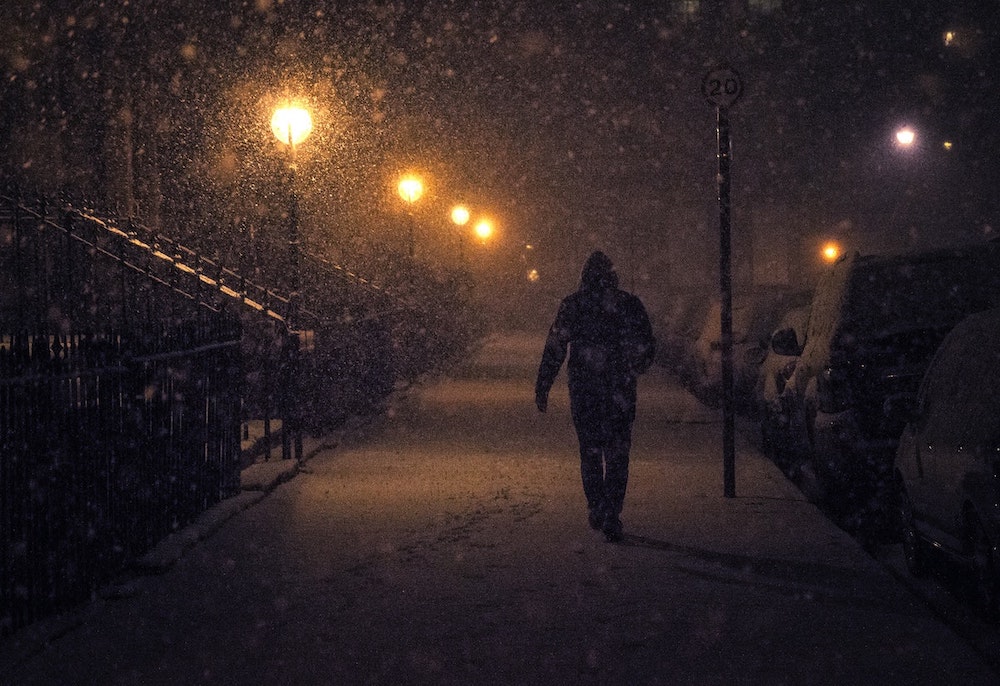Wentworth sat alone in his apartment on New Year’s Eve, daydreaming about a reading party held in honor of his debut novel, which in reality remained unfinished. The well-dressed guests sipping coffee and cognac, the dimly lit library with mahogany chairs and velvet cushions, the floor-to-ceiling bookshelf walls; it was a magical scene. He allowed these images to take hold of him as though for the first time, when in fact they had played out in his mind before, like a film on repeat.
Hunched over his wobbly barstool in his kitchenette, Wentworth smiled to himself. After flirting for weeks now with how many lightbulbs a person truly needed to get by inside a snug railroad apartment, one by one they had all popped and sizzled until he was left with nothing but the natural light of the day and the darkness of night. He hadn’t had to change an energy efficient lightbulb in years and now, suddenly, there came a day of reckoning.
That night, the stove lamp was the last source of light in the whole apartment. In that filament of burning electricity sat a stack of papers, leather bound, labeled not entirely facetiously “Failures.” It was his private notebook. In the dim light of the stove lamp Wentworth began to write. Regrets of this past year …
But his writing was interrupted by the simultaneous flickering on and off of every light fixture in his apartment. Even some kitchen appliances flashed brightly to life. Startled, the pen slipped from his hand, and the beating of his heart was so loud that at first he wondered where the noise was coming from. Once things settled down, he thought he heard the faint sounds of joyous laughter coming from inside his notebook. He put his head down until his ear rested level with the top of the journal and listened. Silence. Pretty soon he fell asleep with his face smashed into his notebook.
Later on that evening, Wentworth found himself at the Heath Tavern around midnight. He couldn’t recall drunkenly stumbling down the three flights of stairs in his building, disturbing the older neighbors with his loud movements, nor is it safe to say could he remember slipping on a patch of black ice that night when he crossed Humboldt Street on the way to the bar. But that’s exactly what happened.
The Heath Tavern, a hole-in-the-wall bar ordinarily dead on a weekday night, was jam-packed for the holiday. Its dark interior, low ceilings, and long, narrow bar had something of a dungeon quality to it, which Wentworth rather admired. But that night, small, little gleaming red, blue, and silver sparkling balls hung from the old-fashioned tin roof ceiling, giving the place a warmer, gentler atmosphere than to which he was otherwise accustomed. At first, he was amused by the new decorations. Then, partly because it took forever to be served a drink, and partly because the music was blaring more loudly than usual, he found them irritating. With his mood spoiled, his beer getting warmer, he started spacing out by the back area of the bar.
“You okay over there?” the bartender asked him.
“What?”
“Do you want something?”
After a few beats, Wentworth took in his surroundings, and like waking up from a dream and slowly recognizing the familiar walls of a room, he heard himself order a scotch, “neat please,” in a voice he didn’t recognize as being his own. He smiled vaguely at the bartender, but she paid him no attention. A song from a late ’90s Australian rock band came on that he couldn’t stand, and as if on autopilot, he ducked outside for refuge despite the cold. He left his unpaid-for drink unattended. He would have been short on tip anyway.
Walking home on that chilly December evening, the last night of the decade, he crossed Humboldt again, slipping on the exact same patch of black ice as he had on the way to the bar, only this time, miraculously, after scampering on the ice like a cartoon character, he caught his balance and didn’t fall. A small group of smokers stood outside the bar and cheered on this athletic, if awkward, feat of his. Full of adrenaline, Wentworth turned to face his antagonists, whose clapping he was of two minds about: were they mocking him or were they genuinely impressed? “Nice moves!” one of the smokers called to him. Wentworth performed an exaggeratingly-low bow in their direction, pirouetted on one foot, then went on his way, walking the rest of the way home underneath a listless gray sky with his hands shoved deep into his coat pockets and his nose upturned to the world in a gesture of defiance.
Turning down his street and approaching his apartment, he noticed something peculiar in his bedroom window; a golden light was glowing like a star from atop a Christmas tree. “That’s no good,” thought Wentworth. He didn’t remember leaving the lights on—not that he had any to leave on—and he didn’t have a Christmas tree. So what was this object shining in his apartment window, as if waiting patiently for his return? He raced up to the top of his staircase and was alarmed to see a bright light flowing out into the otherwise dark hallway from underneath his doorframe. He stood as still as a statue as he contemplated his next move.
It was coming directly from his kitchen. Impossible!
He fumbled for his keys, dropped them, but thanks to the yellow light creeping through the door, was able to retrieve them easily enough. Opening the door cautiously now, the light pouring out into the corridor, Wentworth shielded his eyes.
“Hello? Who’s there?” he said in a voice choked with fear, not to mention weakened from smoking too many cigarettes.
He checked his phone but there were no texts or missed calls from his friends or family members. Standing in a kitchen that looked very much like his own, only newer, it suddenly occurred to Wentworth that he must be in the wrong building. He glanced around the room again just to be sure, but his notebook was nowhere to be found, and the kitchen table sitting where his sat looked a lot nicer than his old crummy one held together by duct tape.
But why would his keys have worked?
Feeling brave and confused, he stepped further into the apartment, where finally he saw a man and a woman, a couple by the looks of it, sitting next to each other in the adjoining room on a fancy-looking sofa he’d never seen before. They sat in the exact same spot where his old worn-out couch once sat, toasting their champagne flutes lovingly.
He recognized the woman right away. She was beautiful, more beautiful than when he’d last seen her, which was … He wasn’t sure exactly. He had no idea what she was doing inside his apartment now on New Year’s Eve, and with this strange man. Samantha, that was her name, stood up from the sofa, smoothed out the creases of her long red evening gown, which hugged her body tightly, and walked right by her ex-boyfriend (ex-fiancé, technically) as if he, Wentworth, were invisible. As she headed towards the refrigerator, Wentworth followed her, struggling to keep from staring at her familiar figure.
He recalled the last time he had seen her. It was on a previous New Year’s Eve many years ago, when the two shared a meal from a tiny, expensive noodle shop in the Lower East Side, whose name he could no longer remember. It was right around that time when they seemed to be traveling down an inevitable path of sharing a life together that Wentworth started to feel suffocated with it all; Things started to go south for their relationship, mostly to machinations of his own makings. By the end of that very same night he had reneged on the proposal.
He glanced over at the strange man still sitting on the couch and was immediately taken aback by how much he looked like him. Then Wentworth realized with a shock that nearly knocked him over that he was looking at a skinnier, healthier double of himself, as if an artist had drawn a slightly exaggerated version of him. That’s when he knew he had had too much to drink. It was time to end this night and go to bed. The thought alone was almost sobering.
He crashed on a bed that was at least three times the size of his old one. Even as he told himself it was all a dream he couldn’t get the couples’ sickeningly sweet voices out of his head as they sat on that elegant sofa in the next room whispering and giggling to each other. Unable to fall asleep, he kept thinking about her, Samantha Chu.
Ah, Sam, he thought with longing. Sammie!
He thought of Kierkegaard, the great Danish philosopher who had once stood at the matrimonial edge of the abyss with his lover, unable to take that final leap of faith into the so-called institution of marriage. “Why so-called?” Wentworth thought to himself, changing positions in the bed, now lying on his side but still feeling equally uncomfortable. No, he couldn’t bring himself to go through it and walked away from what seemed to be a done deal, foreclosing on the potential of their promised happy future together. He justified his actions to Sam by intellectualizing them. He was always trying to round out the roughest edges of his experiences with historical or philosophical examples. He left Sam not for his sake but for hers, or so he said. He couldn’t have accepted her love in good faith. He was willing to give himself over to one thing, that wasn’t the problem, it was just that for him this meant choosing between a life committed to Samantha or a life devoted to, well, Literature, and he had chosen to give himself over to the latter. And how had that worked out for him? The truth was, he couldn’t commit himself to anything.
He felt around in the darkness for the little nightstand lamp. He clicked the switch, and much to his surprise, for he just remembered the bulb had burnt out, he saw a soft orange light glowing beside him. What happened next, even for someone as well acquainted with the terrors of the night as Wentworth, who suffered regularly from insomnia, was beyond cruel. Because when he grabbed the nearest book on the bedside table that night, just for something to take his mind off his sorry state of sleeplessness, an extraordinary thing occurred: the book he grabbed was none other than his own. The novel he’d been working on for several years, but had since abandoned, the novel he had never finished, was somehow handsomely bound and in his hands, published in hardcover edition by, let’s see here (he glanced at the spine), an influential imprint from one of the biggest publishing houses. He opened at random his Kierkegaard-inspired novel called Shadowgraphs and began reading from the top of the page:
In a coffin filled with mushrooms a tree grows upside down …
He might have gone on reading it the whole night if the couple in the adjacent room hadn’t barged in on him so rudely. Frightened, Wentworth shoved the book under the sheets and glanced guiltily at his intruders, as if they’d caught him in an indecent act. But they took no notice of his presence in the bed. Wentworth watched somewhat in awe as the couple kissed right in front of him, and when they kept kissing and things appeared to be escalating, he didn’t look away. Finally, the man, the other Wentworth, broke away from Sam’s embrace, removed his gray herringbone blazer and hung it neatly on the back of a chair that belonged to a little wooden writing desk Wentworth had never seen before. When he saw the typewriter on top of it, he almost laughed. Surely it was just for decoration.
After unfastening the top button of his collar with some difficulty, the young man, his double, tapped lazily on the typewriter, letting the keys smack the air seemingly at random.
As soon as he had started typing, the room began to spin. Wentworth’s head felt full of something horrible, like sadness and darkness mixed together in an explosive concoction. It threatened to swallow him whole. He wanted to scream. He did, but it was inaudible. Neither Samantha, nor this other man that was him but was not him, his doppelgänger, he thought with a touch of pride, took even the slightest notice of Wentworth’s desperate pleas for help.
“You’re not seriously writing tonight, are you?” asked Sam. Evidentially they’d just gotten back from a reading party where everyone in the room took turns reading aloud from his new book. Overhearing these details of the couple’s evening together, the cozy library and the fancy drinks, the coffee and cognac, it was just like he’d always imagined it for himself.
“But it’s my routine,” said the writer without emotion.
“But it’s New Year’s Eve!”
“Not anymore,” said Wentworth’s double, glancing at his wrist though he wasn’t wearing a watch. “It’s after midnight.”
“Why don’t you come satisfy a different quota tonight?” said Sam in a playful voice.
“It’s just a little journaling.” The young man held up a black notebook that Wentworth painfully recognized right away as his own. “Then we can do it?”
“Urgh. So romantic,” but Sam was smiling. She yawned and looked like she was about to fall asleep.
Even though it was just “his journaling,” as soon as this writer, his double, began working that night, a dreadful thing happened to Wentworth. From underneath the heavy duvet cover of the king-sized bed where he lay, he felt something warm and powerful, an unnamable force, tearing at him with great purpose, at his everything: his insides, personhood, lifeblood, his being, all of it melted down and slipped away as soon as this second self of his touched the pen sharply to the little black notebook that night. When the ink dried, the transformation complete, Wentworth opened eyes that weren’t his anymore and he saw an image of himself staring down at him. He saw it all from the viewpoint of the notebook, as if somehow from behind its pages. Wentworth realized in horror: he was the pages; he was the notebook.
Just as his own journal had been an assiduously sad record of his failures and disappointments, of every timid encounter and lackluster attempt he took to gain control of his life—in short, all of the things that had kept him from ever finding happiness, from ever truly feeling content with himself—this parallel notebook chronicled the complete opposite, full as it was of entry after entry detailing only the sweetest achievements and successes the literary life still had to offer a writer in the new millennium.
And yet, losing himself in the notebook wasn’t an altogether unpleasant experience even though he knew this entrapment marked the end of things as he knew them, and that he would have to make way for this other, better self of his once and for all. Seeing things in this light, he was at peace. Such were his sad last thoughts before success overcame him entirely.
Photo by Roan Lavery on Unsplash




